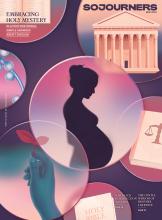A STORM BLOWS through Weyes Blood’s fifth album, And in the Darkness, Hearts Aglow. A cold front of disillusionment meets the swirling tones of songwriter Natalie Mering. The effect is gorgeous and staggering.
Sounding both in and out of their time, these songs fuse darkly majestic orchestral arrangements with pop elements such as drum machines, synthesizers, and the occasional guitar. If history took a later start, this could be our classical music. Weyes Blood (pronounced “Wise Blood,” a nod to Flannery O’Connor’s novel set in the “Christ-haunted” South) has said that she craves sanctuary acoustics.
Billowing and hymn-like, “God Turn Me Into a Flower” is the album’s truest prayer. “It’s good to be soft when they push you down,” Mering sings. She sings to stand firm, but never aspires to twist into bramble: “... it’s such a curse to be so hard / You shatter easily and can’t pick up all those shards.”
Read the Full Article

